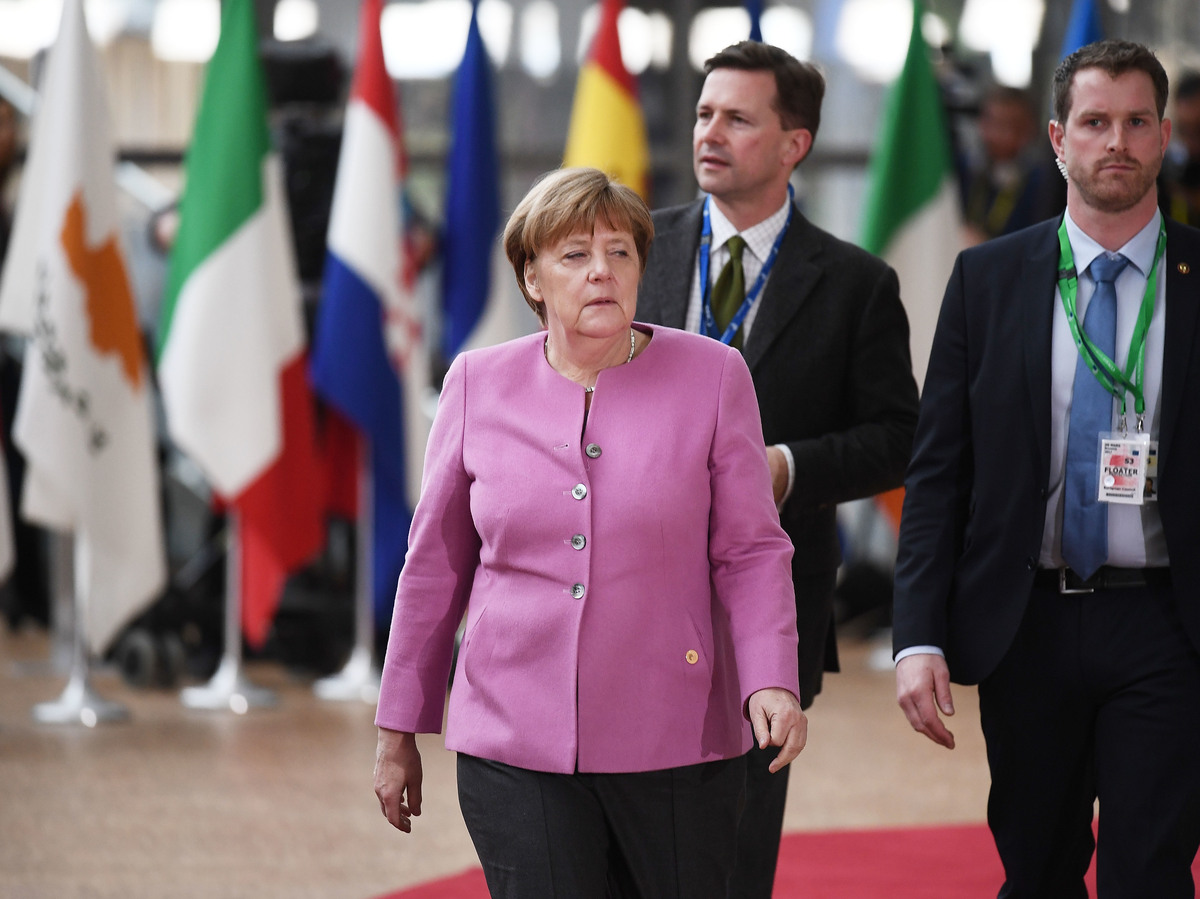
German Chancellor Angela Merkel at the Council of the European Union, on the first day of an EU summit last week in Brussels. Carl Court/Getty Images hide caption

German Chancellor Angela Merkel at the Council of the European Union, on the first day of an EU summit last week in Brussels.
Carl Court/Getty ImagesWhen German Chancellor Angela Merkel meets President Trump for the first time at the White House on Friday, she won't be making her visit alone. She is embarking on her trans-Atlantic trip with some notable companions: top executives at BMW, Siemens and the industrial parts manufacturer Schaeffler.
Her high-placed company sends as good a message as any about the direction Merkel expects these introductory talks to take. The two world leaders are expected to discuss wide-ranging issues — from NATO to Russian President Vladimir Putin, from the European Union to North Korea — but business matters may well dominate their two-hour conversation and working lunch.
And unavoidably with business comes the question of trade.
"She wants to make the point that the companies have created thousands of jobs in the United States," Tanit Koch, the editor of the German newspaper Bild, tells NPR's Rachel Martin.
Germany's Angela Merkel To Meet With Trump
Germany's Angela Merkel To Meet With Trump
- Download
-
<iframe src="https://www.npr.org/player/embed/520498583/520498584" width="100%" height="290" frameborder="0" scrolling="no" title="NPR embedded audio player">
Citing Merkel's interview with another German paper, Saarbruecker Zeitung, the BBC says the chancellor plans to remind Trump that BMW's plant in South Carolina exported "more cars than GM and Ford together" from America.
"I'll make that clear," Merkel added.
She's also expected to emphasize that an import tax on German goods to the U.S. — which during his campaign, Trump threatened to impose on countries that have a trade surplus over America, the BBC notes — would hurt both nations in the long run.
"The English word she puts a lot of emphasis on right now is the word 'reciprocity,' " Koch says. "So if there's an import tax coming from the U.S., then the U.S. will probably have to face something similar from Europe."
Trump, for his part, "will be very interested in hearing the chancellor's views on her experience interacting with Putin," an administration official tells NBC. Few leaders on the world stage have more experience in this realm than Merkel, a Russian speaker who has had her fair share of interactions with the Russian president during the dozen or so years she has been chancellor.
Still, as the German publication Deutsche Welle points out, "the bar of what to expect from their first meeting [is] rather low, especially given the prior verbal tiffs between them and their different domestic audiences."
And those "prior verbal tiffs" are not insignificant.
Both as a candidate and president-elect, Trump had some harsh words for the German leader, saying she is "ruining Germany" and has "made a catastrophic mistake" in welcoming more than a million migrants and refugees in recent years.
"The German people are going to end up overthrowing this woman," Trump said on the campaign trail. "I don't know what the hell she's thinking."
In turn, Merkel offered Trump a tepid note of congratulations shortly after his election, taking the opportunity to state that:
"Germany and America are bound by their values: democracy, freedom, the respect for the law and the dignity of human beings, independent of their origin, skin colour, religion, gender, sexual orientation or political position. On the basis of these values I offer the future president of the United States, Donald Trump, close co-operation."
Trump's skeptical view of NATO — asserting that others in the defensive alliance have not been paying their fair share — has also made Germany and its European allies wary. The treaty sets a goal for member states to spend 2 percent of GDP on defense; Germany is spending 1.23 percent, according to the BBC.
In a January phone call, Merkel and Trump reportedly agreed on NATO's "fundamental importance." And she is expected to tell her counterpart on Friday that "Germany is committed to do more for the defense, to increase our defense spending incrementally," says Peter Wittig, German ambassador to the U.S.

The Two-Way
European Leaders Worried By Trump's Comments On NATO, EU
German Chancellor Merkel Speaks With Trump
German Chancellor Merkel Speaks With Trump
- Download
-
<iframe src="https://www.npr.org/player/embed/512268742/512268743" width="100%" height="290" frameborder="0" scrolling="no" title="NPR embedded audio player"> - Transcript
He tells PBS NewsHour that in the wake of Brexit, which Trump has loudly applauded, Merkel also will stress that "we will do everything to keep the European Union as a strong and resilient economic and political union."
All this makes for a tenuous balance for the German chancellor, who faces a tough national election of her own in September.
"What we know from the polls — as much as we can trust them nowadays — is that you have 80 to 90 percent of Germans saying they pretty much abhor what he's doing," Koch tells NPR.
But anything resembling a heavy-handed rebuke is unlikely. Quite the opposite, in fact: Hopes remain that Friday, if nothing else, might help reset the relationship between the two leaders.
Or as Merkel told Saarbruecker Zeitung: "It's always better to talk with each other than about each other."
No comments:
Post a Comment